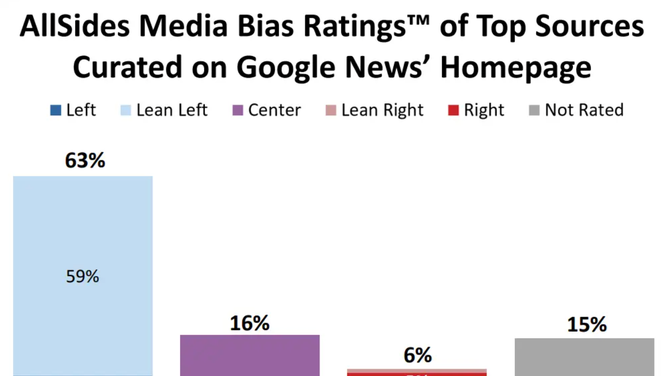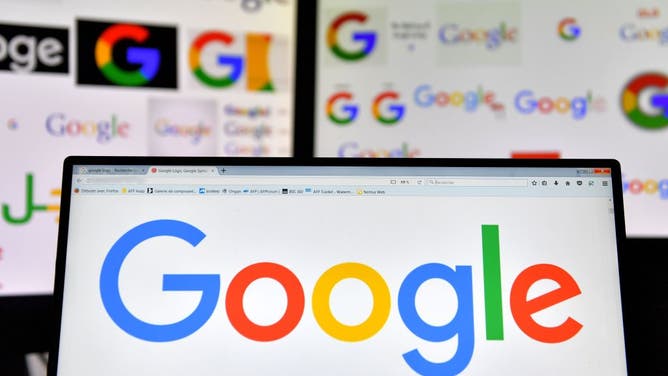Google, The Most Powerfully Partisan Force On The Internet | Bobby Burack
Google is the most powerful source of information on the internet, accounting for nearly 92 percent of the search engine market share in the United States. The influence of the search engine powerhouse far exceeds the likes of Facebook, X, and Instagram.
Consequently, the partisan whims of Google loom over the 2024 presidential election.
This week, Google confirmed the authenticity of nearly 2,500 leaked internal documents that allegedly belonged to the service. The documents previously in question detail data that Google tracks, which it uses to manipulate search results via its closely guarded algorithm.
The trade publication Search Engine Land reviewed the documents and discovered a particularly ominous note. Per the publication, the documents mention modules that suggest Google implements "whitelists" for certain topics, specifically related to elections (IsElectionAuthority) and Covid-19 (IsCovidLocalAuthority).
In 2016, a Google Search employee stated that the company doesn’t "have a website authority score." The references to a "whitelist" say otherwise.
Remember, a recent AllSides analyst study found that 63 percent of articles on Google News are from "left-leaning outlets," compared to just 6 percent from "right-leaning sources."
The existence of a "whitelist" – or authority scores – suggests that the disparity between "left-leaning" and "right-leaning" news stories is not without method, as Google claims, but the result of human manipulation.

Coincidence?
Hardly.
The finding is consistent with a Media Research Center study from March that determined Google "interfered" with the search results regarding major U.S. elections "41 times over the last 16 years."
MRC vice president Dan Schneider and editor Gabriela Pariseau summarized their findings below, describing how Google's "interference" disproportionately benefited the most liberal candidates.
"[Google's impact] has surged dramatically, making it evermore harmful to democracy. In every case, Google harmed the candidates – regardless of party – who threatened its left-wing candidate of choice."
"From the mouths of Google executives, the tech giant let slip what was never meant to be made public: That Google uses its great strength and resources and reach to advance its leftist values."
Specifically, Google suppressed news critical of Biden in 2019 and 2020 by "burying in its search results the campaign websites of every one of his significant opponents."
As an example, per former presidential candidate Tulsi Gabbard's lawsuit, Google "de-ranked" her Ads account just as she became the most searched candidate following the first Democratic Party primary debate in 2020.

(Photo: LOIC VENANCE/AFP via Getty Images)
And then there is the oft-buried research by psychologist Dr. Robert Epstein.
In 2019, Dr. Epstein testified to the Senate Judiciary Committee that "biased search results generated by Google’s search algorithm" shifted "at least 2.6 million votes to Hillary Clinton."
Thusly, Epstein took a more proactive approach to researching how Google operated in the following election.
In 2020, Dr. Epstein published a study in which he found evidence that Google's search results during the weeks and months before the election presented a "strong bias in favor of Democrats."
"We found a period of days where the vote reminder on Google's homepage was being sent only to liberals," Epstein told Fox News at the time. "Not one of our conservative field agents received the vote reminder."
"The bias was being shown to pretty much every demographic. This includes conservatives. Conservatives got more liberal bias in their search results than liberals."
Epstein concluded that Google shifted "at least six million votes in favor" of Joe Biden.
"That's the bare minimum," he warned.
Conclusively, the most powerful search engine in the world willfully manipulates the distribution of information with a considerable editorial bent.
Google's algorithm is in many ways the default Ministry of Truth, deciding to which sources voters have access. For example, 99 percent of users only click on links on the first page of a Google result.
Meaning, where a story is placed – or "ranked," as the documents explain – essentially dictates the influence of that story.
Notably, users had to scroll to the second page of Google (where only one percent of users visit) to find a headline that included the full context of Donald Trump's much-maligned "Bloodbath" comment last March.
See by clicking the play button below:
At this point, you might wonder aloud what's stopping this near-monolithic entity from using its uncontested power to swing votes in November.
The answer is nothing.
Google can and will put its stamp on the 2024 presidential election, as it has, per studies, on "at least" every election since 2008.
The censorship industrial complex is not a conspiracy. The censorship industrial complex is real. And Google is its most profound member.